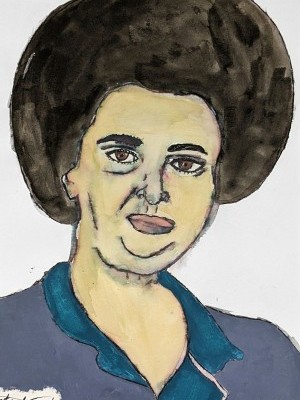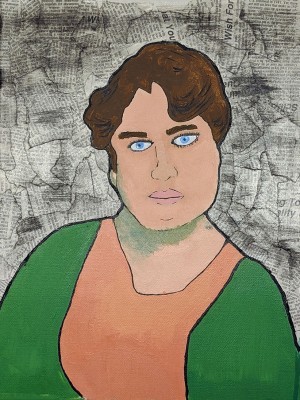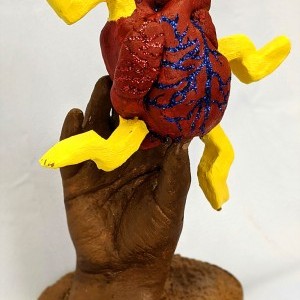Botsalano Makgabo
Olney Friends School | Barnesville , OH | 11th
Inspirational Family Member
Great-Grandmother Maud
Maud was born on the 27th of July 1927 in Kwaguga, a township in the west of an industrial coal town in Emalahleni in South Africa. She was born in a humble family that instilled strong, fundamental human values within her. Her mother, Sophie Madolo was a domestic worker and her father was a mine worker. Maud was very close with her younger sister, Granny Pauline Madolo Phahla. They were the greatest of friends, they took care of one another; they were practically inseparable. They went to only Catholic schools because the Catholic church sponsored their education. They both went to Malomeni Primary School and progressed to Glen Cowie Community School and ultimately, Our Lady's College. As they got older, both of them got married and, geographically, they were separated but they still loved each other and by all means tried to remain in contact with one another.
In 1959, Maud got married to Percy Mmole Sehloho, a man who was also born in a family that lived by strong values. He was a member of the Pan Africanist Congress. First, they settled in Witbank, then moved to Mamelodi, and ultimately Atteridgeville. During their young days, Maud and her husband ran a family business together. They were very generous in doing so; Maud would give free groceries to the elderly in the community. She and her husband had 8 children together: 4 boys and 4 girls. They had a big family and integrated well into the community of “Pheli” (Attridgeville). She was well-known for her wonderful character. She was a good wife, mother and community member. For a long time, they lived at the corner house in Attridgeville. The house still belongs to the family and is shared by her children and grandchildren.
In 1994, it was the turning point in South African history. All people of color (men and women) were finally granted their right to vote. Generally, it was an emotional and incredibly exciting moment for the country. On the day of the elections, Maud and her husband woke up very early to stand in extremely long queues to cast their votes at a voting station near their home, Mboweni Primary School. The experience was liberating for both men and women as they all felt a sense of power and belonging in their country. Women felt extremely empowered as they could finally have a say in politics in their country and a voice. Their cries too were heard for the first time. Every mother encouraged her children to vote and taught them the significance of doing so. At the time Maud was old, and so were her children. Maud encouraged her children to vote and liberate themselves from the hostile environment that they were born into.
Before her death, Maud's sister, her children, grandchildren, and great-grandchildren took care of her. She died in 2007 and was buried at a graveyard in Attridgeville where she was reunited with her husband. Her family still celebrates her and keeps the wonderful memories of her deep within their hearts.
Historical Figure I Admire
Marguerite Durand
Marguerite-Charlotte Durand de Valfère was a French stage actress, feminist journalist, a women's rights advocate and a leading suffragette. She was born January 24, 1864, and raised in France. She was the daughter of a Royalist colonel in the French army, Alfred Boucher. Her father was later promoted to a general and Anna-Alexandrine Caroline de Valfère –her mother– wrote under pseudonyms for newspapers. Marguerite and her half brother, Charles, were born out of wedlock. Marguerite's father, Alfred, took her as his own daughter and she kept relations with him and his family even though he did not marry her mother.
Her mother was a hardworking woman who took care of both her and her brother; she died in 1911. Marguerite went to a Roman Catholic convent school, the Dames Trinitaires in Paris for her primary education. In 1879, she joined a class at the Conservatory of Dramatic arts and did astoundingly well winning honorable awards such as the First prize for Comedy. In 1881, she joined the 'Conservatoire de Paris,' then the Comédie Française, and for many years she enjoyed acting and starring in multiple shows such as 'Les Femmes Savantes'. She grew in popularity and sparked a profound reputation for herself.
In 1886, she left her acting career and married Georges Laguerre, a lawyer, politician, deputy in parliament, and a leader of the Republican Committee of National Protest. He exposed Marguerite to the world of politics when he was supporting General Georges Boulanger's political ambitions. Marguerite got exposed to journalism when she was helping with the Boulangist tabloid, 'La Presse'. She began to adopt negative opinions on the movement, because of the involvement of bribery and royalist money. In 1891, she and Laguerre separated but remained friends. She continued with her journalism; she started to work for an avant-garde, popular, French magazine, 'Le Figaro' that was exclusively about fashion, politics and trends. She then had a child with the literary director who had initially hired her at 'Le Figaro,' Antonin Périvier. Subsequent to Marguerite leaving 'Le Figaro” after a dispute, Périvier tried to take her child away from her but she prevailed and kept her son.
But that was just the beginning of her revolution...
In 1896, she wrote an article on the International Feminist Congress and did a phenomenal job. The process of writing the article had a great effect on her, as she was inspired and moved by the feminist movement by Marie Pognon and the women that were involved. In 1897, December 9, she founded her own feminist daily newspaper that was dominated, and entirely run by intelligent, ground-breaking women; her reputation helped her attract women from all over to help run it. Her newspaper, 'La Fronde' included collaborations with women outside of her paper such as Pognon and other well-known women at the time. It was described as first class and it was held up high in society.
The editorials in the newspaper advocated for women's rights and demanded that women be allowed to participate in parliament and also have the opportunity to be nominated for the 'Legion of Honor' (which is the order of the highest merit for military and civil service in France). They also asked that women be allowed to hold Senate or Paris Municipal Council titles, and other high positions in society – these positions at the time were intensively male dominated. Their efforts therefore showed to be effective; Marguerite became the first woman to be admitted to the Union of the Newspaper Directors. The workers made public, non-verbal statements in their feminine attires such as lacy clothing, briefly expressing their natural feminine nature. They regularly campaigned for the abolishment of the Napoleonic laws that did not have women's rights in their best interests. They protested for equal pay between men and women and equal job and educational opportunities. In 1900, she organized a congress for the rights of women at the World's Fair in Paris. In 1910, she organized female candidates for the legislative elections and she helped organize a few trade unions that protected women's working rights.
In 1931, she contributed all her documents on Feminism and its history to the French government. In 1932, the 'Bibliothèque Marguerite Durand' opened in Paris - it was a library that was named after her that many researchers worked in. In 1936, March 16 Marguerite died of a heart attack.
Explore the Archive
More From This Class
Click on the thumbnails below to view each student's work.Deadline Extended
There's still time to join Women Leading the Way.
Become a part of our storytelling archive. Enroll your class today.
Join the Project




